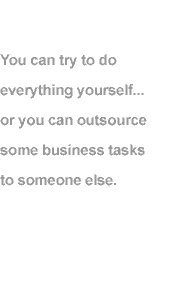 |
|
||||||||||||
 |
|
||||||||||||

|

|
|
By Kathy Spring
|
When you're an IP, you can divide your work time into two categories. There's the time you spend designing buildings, writing articles, taming lions -- whatever it is that you do for a living. And then there's the time you spend taking care of the tasks associated with running your own business -- tasks like accounting, bill collecting, marketing, or Web design. Often it's how well you handle these non-core tasks that determines your success as an IP -- which is why some of the most successful IPs have decided not to handle them at all. They outsource their dirty work to other IPs. (Of course, one person's dirty work is another person's specialty.) Outsourcing the peripherals of your business ensures that these important tasks are being done properly, and frees you up to spend more enjoyable -- and billable -- hours doing your core work. The Most Precious Resource Robert W. Bly is a New Jersey-based copywriter, a marketing communications consultant, and the author of numerous marketing books. He credits handing off work as the secret to his success.
"I haven't been to a bank in seven years or the post office in eight years -- because those things are a waste of my time," Bly says. "And time is the only thing I have to sell." Bly farms out all non-core tasks, and since he started doing so, he's more than doubled his revenue. He advises other solo professionals to seek help right from the start. "The most common mistake people make is not to outsource when their cash flow is low because they 'can't afford it,'" Bly says. "You can always get more money, but time is the one resource you have that can't be replenished -- once it's gone, it's gone forever." It's the Little Things That Add Up Stever Robbins is a new IP who, somewhat reluctantly, has decided to outsource some of his business tasks. A year ago, Robbins left an Internet strategy consulting firm and founded Venture Coach, a one-man consulting firm that helps start-ups establish and maintain business priorities. Right from the start, the Harvard MBA decided that he would concentrate on consulting and find others to take care of the necessary tasks that are part of every business. To date, he has farmed out legal work, accounting, clerical work, Web design, and marketing. But shelling out the bucks for one independent contractor after another isn't always easy -- and is sometimes painful. "Every time I do it, I'm reluctant. It costs money," Robbins says. He watches the outflow carefully, measuring it against the time he's saved and the resulting increased revenues. So far, so good. "I can't believe how much time it frees up," he says. He's especially pleased with his decision to bring in once-a-week help with bill-paying and other financial chores. "Before I started my business, friends said 'Get a bookkeeper,' but I ignored them," Robbins recalls. But when he started dealing with the paperwork on his own, he soon found he was spending a day and a half every week on bills; the task was more complicated than he had originally thought. To keep the IRS happy, he had to be careful to separate business and non-business expenses and make sure he was paying bills out of the correct business or personal bank account. It was too much to handle. Eventually he decided to hand off the chore. Now he relishes walking into his home office knowing he will see no bills lying around. "It's one more thing that's not on my mind," he says. And it's the little things, like a tangle of bills -- and the anxiety they generate -- that can derail a business. "Think of a clock," says Robbins. "If you put a stick in the works, it will stop. And the cause will be obvious. Throw sand in the works, and it's not one big thing. But there will be problems." The Costs of Outsourcing Robbins is so committed to spending his timely solely on his consulting work that he hired someone to design his Web site, despite the fact that he also has a computer programming degree from M.I.T. "Web design is one of the simplest programming things you can do," he says. "But given the choice," he says, "I decided I should be out looking for clients." And now he's getting help with finding clients, too. "I started noticing the stuff on my to-do list that never got done," Robbins explains. "I did an analysis, and it all could be put under P.R., so I took a very deep breath and hired a marketer." His marketing pro knows how to promote a business, he says, because it's what she does -- full time. He just doesn't have the knowledge or contacts to do the best job in this vital area. But hiring a marketer was a costly decision -- her services don't come cheap. At first, sixty percent of his income went to his marketer. Now that number is down to thirty percent. He's a little nervous about the expense, but he's monitoring the results carefully. He's confident that a year and a half down the road, his business will be infinitely more profitable because of this help. Washing Your Hands of the Miserable Chores For over 20 years, Barbara Hemphill has been showing business owners, many of them IPs, how to organize for maximum productivity. Twelve years ago, she decided that she'd achieve maximum productivity by outsourcing some of the necessary tasks involved in running a business. "Outsourcing is the key to my success," Hemphill declares. Whether it's accounting or Web design, marketing or hair styling (she gives a lot of television interviews), Hemphill happily hands it off. "You want to get it done by the people who do it best."
For every task that an IP finds a miserable chore, there is someone -- often another IP -- who relishes the work. Take the woman who collects Hemphill's overdue bills.
|
|||||||||||||||||||||
|
||||||||||||||||||||||
|
August 21, 2000 Primary Editor: Katy Demcak Illustrator: Bill Ross Production: Fletcher Moore |
We'd love to hear your comments about this article! Kathy Spring is a freelance writer who lives in Princeton, New Jersey. If you like, we'd be happy to put you in touch with her, or with any of the other IPs named in this article. |
|||||||||||||||||||||
|
|
||||||||||||||||||||||